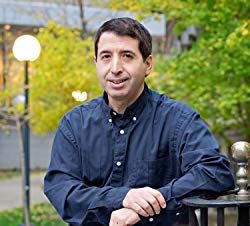Prof. Ian Hacking, one of today’s most influential philosophers, has been awarded one of the largest prizes in the humanities. The Switzerland-based International Balzan Prize Foundation honoured the long-time U of T professor with its US$800,000 prize for his “fundamental and pioneering contributions to philosophy” and for his groundbreaking work in many branches of the history and philosophy of modern science.
When told of the award in September, Hacking told U of T News that it was “unexpected,” adding that he’s delighted that a condition of the award is sharing the prize money with up-and-coming colleagues. “Half of the money will be given to the philosophy graduate department to support younger researchers,” he said. Prof. James Robert Brown, who also teaches philosophy at U of T and has known Hacking for many years, called the prize money a “terrific” bonus for the department.
Hacking, who now holds the title of University Professor Emeritus, earned his PhD from the University of Cambridge and joined U of T’s philosophy department in 1983. He’s written 14 books and authored more than 300 papers. “Ian is one of the most important philosophers in the world,” Brown says. “If you were to try to list the 10 top philosophers working today, Ian would be right in the thick of it.”
Hacking is known for his contributions to the history and philosophy of science and medicine, the philosophy of mathematics, and, especially, the philosophy of experimental science. For decades, philosophers debated various versions of “scientific realism,” arguing about what should and should not be considered real in the light of modern scientific investigation. In the 1980s, most philosophers were focusing almost exclusively on scientific theory, but Hacking wasn’t afraid to put experimental science under the microscope, so to speak. He came up with the idea of “entity realism” – the notion that entities should be considered real if they can be manipulated in the laboratory, even if the objects themselves are too small to be seen. In his 1983 book Representing and Intervening, Hacking used electrons as an example: They’re real, he said, because physicists routinely make use of them. “If you can spray them, they are real,” he wrote. Adds Brown: “It’s one of those things that people have picked up; it’s become like a bumper sticker.”
Even when an object can be seen, that’s not enough, Hacking argues. It’s when we manipulate the object that we know it’s really there. “When you can poke at things – like cells in a microscope – or use things, like electrons, to poke other things, that’s what clinches their reality,” Brown says. The flip side is that when entities can’t be manipulated, Hacking calls for skepticism. He has argued, for example, that no matter how confident we are in the theory that predicts the existence of black holes, because we can never manipulate them, we should not treat them as “real.”
Hacking’s work, Brown says, “stimulated an enormous amount of research into the experimental side of science.”
Recent Posts
For Greener Buildings, We Need to Rethink How We Construct Them
To meet its pledge to be carbon neutral by 2050, Canada needs to cut emissions from the construction industry. Architecture prof Kelly Doran has ideas
U of T’s 197th Birthday Quiz
Test your knowledge of all things U of T in honour of the university’s 197th anniversary on March 15!
Are Cold Plunges Good for You?
Research suggests they are, in three ways





